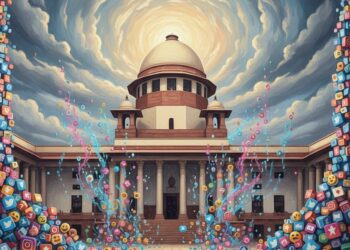To Arundhati Roy it seemed wholly unacceptable that the Supreme Court served notice on her. The Court had displayed “a disturbing willingness to issue notice,” she said. So, the Supreme Court should have automatically assumed that despite being part of a Dharna and shouting slogans against the Supreme Court, Ms. Roy ‘could not have’ committed contempt of court for the simple reason that she was ‘Arundhati Roy’. Better still, all courts must assume at all times that Ms. Roy can do no wrong like the British Crown.
Serving a notice – sometimes referred to as ‘Notice of Motion’ – is an indispensable procedural requirement warranted by the Principles of Natural Justice. Being a ‘legal requirement’, it is not subject to anybody’s choice or discretion. So, the question of “willingness” simply doesn’t arise.
However, Ms. Roy has her own theory of motives. In her opinion, which she, quite oddly, chose to voice in an affidavit, the Supreme Court had issued a notice to her, which it could not have avoided issuing anyway, because the Apex Court intended to “silence criticism and muzzle dissent, to harass and intimidate those who disagree with it”. And she did not just say that it was an ‘instant’, but went ahead to call it an ‘inclination’. Differently put, Ms. Roy said that the move of serving notice on her “indicated” that the Supreme Court had the tendency to oppress its critics.
 Ms. Roy finds it unacceptable that the Supreme Court entertained a petition arising out of the issues that even a local police station did not find fit to act upon. So, the Apex Court should have gone by the ‘obviously better and wiser’ judgment of the SHO, Tilak Marg Police Station. So, if the police is disinclined to act in a matter, the courts, including the Apex Court, must not intervene because Ms. Roy informed us – at least half a century too late – that the SHOs have better judgment than even the highest of the courts. If this is not contempt of court, what possibly could be.
Ms. Roy finds it unacceptable that the Supreme Court entertained a petition arising out of the issues that even a local police station did not find fit to act upon. So, the Apex Court should have gone by the ‘obviously better and wiser’ judgment of the SHO, Tilak Marg Police Station. So, if the police is disinclined to act in a matter, the courts, including the Apex Court, must not intervene because Ms. Roy informed us – at least half a century too late – that the SHOs have better judgment than even the highest of the courts. If this is not contempt of court, what possibly could be.
Fair criticism of any court or its judgments is certainly not contempt. One also has the right to be angry and may also protest peacefully. But Ms. Roy’s attack on the Supreme Court does not fall in any of those categories. The Supreme Court, restating the settled legal position regarding ‘fair criticism’ under the contempt law, said:
As already held, fair criticism of the conduct of a judge, the institution of the judiciary and its functioning may not amount to contempt if it is made in good faith and in public interest. To ascertain the good faith and the public interest, the courts have to see all the surrounding circumstances including the person responsible for comments, his knowledge in the field regarding which the comments are made and the intended purpose sought to be achieved.
The Apex Court also cited Lord Atkin as saying famously, “The path of criticism is public way: the wrongheaded are permitted to err therein… Justice is not a cloistered virtue: she must be allowed to suffer the scrutiny and respectful, even though outspoken, comments of ordinary men.” [ Andre Paul v. Attorney General (1936), AC 322]
The case of P.N. Duda v . P. Shiv Shanker , 1988 (3) SCC 167, was brought to the notice of the Supreme Court by Shri Shanti Bhushan, who represented Ms. Roy in the matter, and it was argued that if the Court could drop the contempt proceedings and be tolerant in the said case despite wild and unfounded allegation by P. Shiv Shanker against the Judiciary, the case in hand must also be treated similarly and the contempt charges must be dropped.
The distinction between the two cases makes the gist of the contempt law clearer. P. Shiv Shanker, who was the Minister for Law, Justice and Company Affairs, delivered a speech before a meeting of the Bar Council at Hyderabad in which he did make derogatory references to the Supreme Court accusing the Apex Court of being elitist, and partial to the elite, wealthy, influential class of the society. He, among other things, said, “The Supreme Court composed of the element from the elite class had their unconcealed sympathy for the haves i.e. the Zamindars. As a result, they interpreted the word ‘compensation’ in Article 31 contrary to the spirit and the intendment of the Constitution and ruled the compensation must represent the price which a willing seller is prepared to accept from a willing buyer.” He further said to the effect that decisions of the Apex Court favoured the Maharajas, the Mahadhipatis like Keshavananda, the Zamindars like Golaknath, and other “representatives of the elitist culture of this country, ably supported by industrialists, the beneficiaries of independence…” “Anti-social elements i.e. FERA violators, bride burners and a whole horde of reactionaries have formed their haven in the Supreme Court,” Mr. Shanker said. However, the Supreme Court, after going through the speech in detail, dropped the contempt charges holding that the Minister attempted “a study of the attitude of this Court”, and in his opinion “the Supreme Court was composed of the element from the elite class”, which was the reason behind its “unconcealed sympathy for the haves”. The Supreme Court found the expression “unconcealed sympathy” improper, but held that it was “also an expression of opinion about an institutional pattern.”
The reference to the Supreme Court judgments in R.C. Cooper case and Keshvananda Bharati case was considered ‘criticism’ of the judicial pronouncements. “Whether that is right or wrong is another matter, but criticism of judgments is permissible in a free society.” The Supreme Court found the statement “Anti-social elements i.e. FERA violators, bride burners and a whole horde of reactionaries have found their haven in the Supreme Court” offensive, but took a tolerant view.
The distinction between the above case and Ms. Roy’s contemptuous remarks is obvious. Mr. Shanker’s criticism might be ‘unreasonable’ or ‘excessive’, but it is still ‘possible’ based on the facts, but Ms. Roy’s diatribe has no factual basis worth the name. It’s childish rant.
Ms. Roy remained unrepentant and remorseless till the end and did not apologize or seek to withdraw her objectionable remarks thereby forcing the Supreme Court to convict and punish her despite trying as best as it could to avoid it. The Apex Court awarded the lightest possible sentence calling it ‘symbolic’ – simple imprisonment for one day – with a negligible fine of ` 2000. A failure to pay the fine could result in an additional imprisonment for three months. With all fanfare Ms. Roy went to the prison in the morning and returned in the evening, and chose to pay the fine. One day in prison for free speech was not a problem, but three months was a little too long for comfort. Free speech is under no threat in India and needs only ‘symbolic’ protection, Ms. Roy might have reasoned.
Originally written for and published in LAWYERS UPDATE in two parts as a part of ‘THE LAW AND THE CELEBRITIES‘ series in October 2012.





